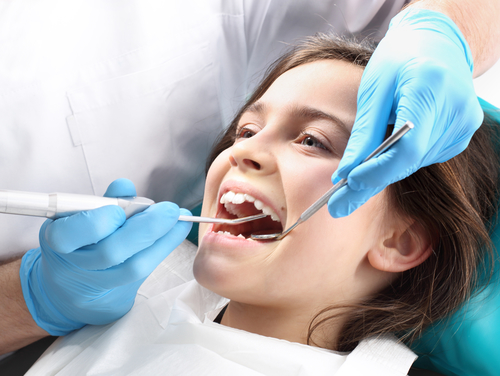
Exactly why are cleanings so important? It probably feels like you’re constantly being told to check in with your dentist. But these appointments are a valuable opportunity to not just check in with your dentist and your oral health, but learn more about your systemic health and how you can engage with the future of your smile. We promise we’re not being dramatic – twice-yearly cleanings will make a big difference. Not convinced? Check out details below on everything that takes place during your next exam.
Been a little while since you last visited the office? There’s no shame in taking a break from routine care, and you shouldn’t let that hold you back from returning. Get in touch today to schedule your next appointment.
What You Might Not Know Takes Place During a Dental Exam
Your exam isn’t all about scraping off plaque and getting your teeth polished. And while those steps are incredibly important, they’re far from everything that takes place during a routine cleaning. The next time you visit our office, you’re also taking advantage of everything listed below.
Oral Cancer Screening
Dentists are typically the first healthcare professional to notice signs of oral cancer. Symptoms are initially fairly minor and need to be spotted by an expert eye. An oral cancer screening can be performed visually, with the dentist examining oral tissues for signs of potentially malignant growths or tissues. Oral cancer can take hold nearly anywhere in the mouth’s soft tissues, including the tongue, gums, floor of the mouth, lips, tonsils, oropharynx and salivary glands. Your dentist will recommend a biopsy if anything looks off.
Oral cancer has been on the rise in recent years due to the spread of HPV. It’s important to receive routine screenings to make sure your mouth is clear. Screenings are quick and comfortable, and patients often don’t realize that they’re even taking place.
If you’re at a heightened risk for oral cancer, you may benefit from more frequent screenings. Some of the risk factors include:
- Being male
- Being over the age of 50
- Smoking or using chewing tobacco
- Frequent alcohol consumption
- Genetics
- Excessive sun exposure
Oral cancer has a far higher survival rate when discovered in its early stages – 83%. But when discovered in a late stage, oral cancer has only a 50% 5-year survival rate. Make sure you’re getting regular exams to avoid any problems related to oral cancer.
Early Disease Detection
Cavities take time to develop, and go through a number of stages. They take hold gradually as they progress through the different layers of your tooth. If a cavity is discovered while it’s still small and superficial, treatment is much simpler. A small filling will prevent the cavity from spreading. But if decay is found once it’s already progressed and affected the dentin, or the tooth’s pulp, much more involved treatment is necessary. An advanced cavity can require a root canal, or even tooth extraction to repair and rebuild the tooth.
Your dentist will notice the enamel showing signs of etching and help you take action to correct the cause (whether it’s poor oral hygiene or an overly sweet or acidic diet), before the cavity progresses. Regular exams make this possible.
Gingivitis works similarly. If you notice gingivitis early on, you actually don’t need dental treatment. Simply improving your brushing and flossing will make it possible to remove the plaque that’s irritating your gums and causing inflammation. Gingivitis can become full-blown periodontal disease if it’s allowed to progress. And periodontal disease is a nasty beast that can return throughout your lifetime (and is more likely to once you’ve already experienced it). Unfortunately, gingivitis can be difficult to spot at home, so an expert eye makes a big difference.
Disease Prevention
While dental exams do help you treat small dental problems before they get worse, they also allow you to prevent future dental problems in the first place. At each exam, your hygienist removes plaque buildup from your teeth. This plaque has the potential to intensify and harden. If plaque turns to tartar or calculus, it can’t be removed at home. It becomes even more irritating to the gums, and can end up causing periodontal disease.
During your cleaning, your hygienist uses a scaler to gently remove any plaque that has formed. This helps you get a fresh start and reduce the risk of future dental problems.
Personalized Oral Hygiene Analysis
Your daily oral hygiene is the primary way you prevent dental problems. Even if you visit the office religiously, every six months, inadequate oral hygiene will still lead to cavities and gingivitis.
Every time you see your hygienist, they will recommend ways for you to boost your oral hygiene and keep your teeth and gums healthy. They’ll notice areas in your mouth that would benefit from some extra TLC, and help you find ways to better address them. This may mean trying a new toothbrush, toothpaste, mouthwash, floss, or other dental aid. We’re experts who spend our careers learning what will benefit our patients’ unique needs – take advantage of our knowledge.
Filling and Restoration Maintenance
Have fillings, veneers, crowns or other dental work? While these restorations work hard to keep your smile whole and healthy, they don’t last forever. Scheduling regular exams allows you to stay ahead of their failure. Rather than encounter a stressful dental emergency, you can set up a time that works for you to replace the dental work in question. We’ll notice signs that a restoration has reached the end of its life and help you set up a plan for replacement.
Dalton Dental Exam | Teeth Cleaning Dalton | General Dentistry Dalton





